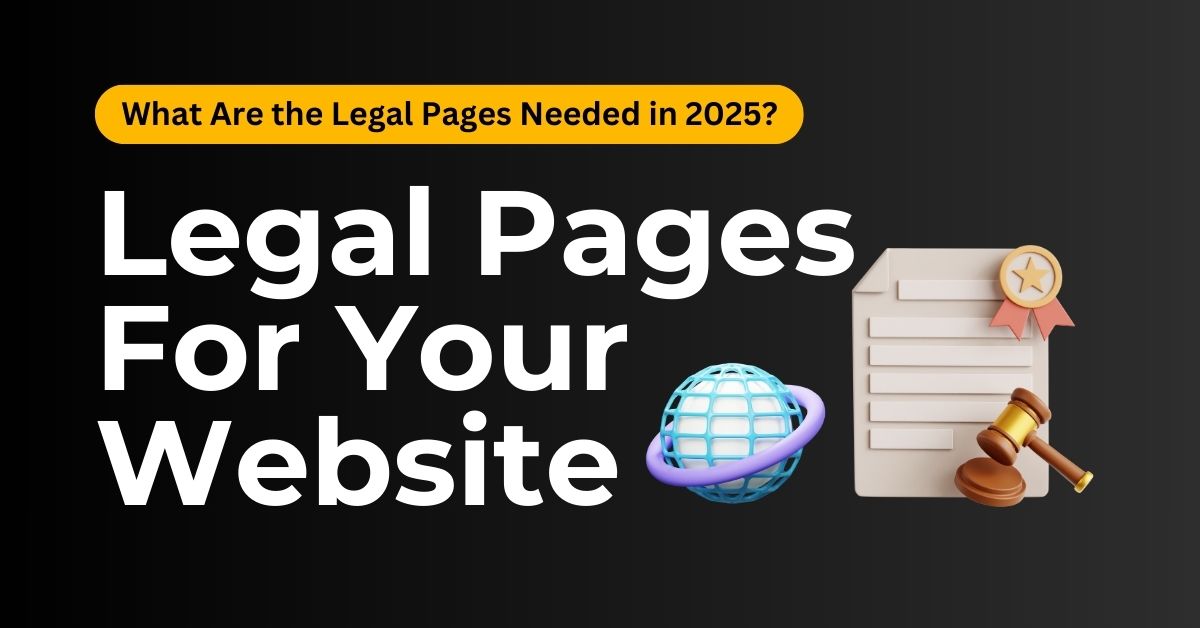

Leading Ad Agency in Jaipur Offering 360° Advertising Services
Digital Marketing Website Development Video Production Social Media Marketing In this Articles In today’s competitive




If you’re launching a website in 2025, having a great design and fast speed isn’t enough. You also need to make sure your website is legally compliant. That means adding all the mandatory legal pages that protect you and your visitors. Whether you’re a startup, freelancer, or running a full-scale business, missing legal pages can lead to penalties, loss of trust, or even legal action.
This blog will walk you through the essential legal pages every website needs in 2025, especially if you’re operating in India or serving a global audience. These pages aren’t just formalities—they’re your first line of protection when it comes to privacy, liability, and customer communication.
Let’s explore the must-have legal pages you should include in your website to stay compliant, transparent, and trustworthy.
A Privacy Policy tells users what personal data you collect, how you use it, and how you keep it safe.
Required by law under GDPR, CCPA, and India’s Digital Personal Data Protection Act.
Builds user trust
Helps your site rank better on Google
🟡 Include: types of data collected (emails, IPs, cookies), why you collect it, third-party sharing (like Google Analytics), and data storage practices.
Also known as Terms of Service, this page outlines the rules visitors must agree to when using your site.
Protects your business legally
Prevents abuse of your services
Sets clear guidelines for refunds, cancellations, and usage
🟡 Include: user responsibilities, prohibited actions, intellectual property rights, payment/refund policy (if any).
If your website offers advice, reviews, or informational content, a Disclaimer is essential.
Shields you from liability
Clarifies the intent of your content
Especially crucial for health, finance, tech, and legal content
🟡 Include: “Information on this website is for general purposes only. We do not guarantee accuracy or outcomes.”
If your site uses cookies (almost all do), especially for analytics or ad tracking, a Cookie Policy is a must.
Required under GDPR and other privacy laws
Explains how cookies track user behavior
🟡 Include: what cookies are, types you use (e.g., session, third-party), and how users can disable them.
🔔 Bonus: Add a cookie consent banner to notify users.
If you sell products or services online, this page explains your refund conditions.
Mandatory for eCommerce websites
Sets customer expectations
Helps in resolving disputes fairly
🟡 Include: refund eligibility window, conditions for returns, process, contact info.
If your website involves product delivery, a clear Shipping Policy helps avoid confusion.
Sets delivery timelines
Explains extra charges (if any)
Improves customer satisfaction
🟡 Include: delivery zones, estimated time, courier partners, delays disclaimer.
This may not sound “legal,” but your Contact Page is crucial for transparency and trust.
Required under Google’s guidelines
Shows authenticity of your business
Helps users reach you for support or legal concerns
🟡 Include: company name, email, phone number, physical address, and a contact form.
This page shows your commitment to making your site usable for everyone, including those with disabilities.
Becoming essential globally
Makes your site inclusive
May help with lawsuits in some countries (like the U.S.)
🟡 Include: accessibility efforts, tools used, how users can report issues.
⚖️ India’s data protection laws are now stricter than ever.
🔍 Search engines prefer websites with clear legal structures.
🧑💻 Users are more privacy-conscious and cautious.
🤖 AI-powered search engines (ChatGPT, Gemini, Perplexity) pull info from legal & structured sites.
Use templates written by legal professionals
Keep them updated yearly
Link all pages in your footer
Use clear, readable language
✅ Pro tip: Use your brand voice but never copy legal content from another website.
Adding legal pages to your website isn’t optional—it’s essential for building trust, credibility, and legal protection in 2025 and beyond. Whether you’re running a service-based business, blog, or online store, these legal pages create a solid foundation for online success.
Yes, whether you run a business website, blog, portfolio, or eCommerce site, certain legal pages like Privacy Policy and Terms & Conditions are highly recommended and often mandatory to stay compliant.
The Privacy Policy is the most critical page, especially in 2025 with stricter data protection laws like GDPR, CCPA, and India’s DPDP Act.
No. Every business is different, and copied content can lead to legal risks. It’s best to create custom legal pages tailored to your business or use templates reviewed by legal experts.
Yes, if your website uses cookies (like Google Analytics or remarketing ads), you must inform users through a Cookie Policy and a consent banner.
Ideally, review and update your legal pages once every year, or whenever there’s a change in data policies, laws, or your business model.
You may face penalties, loss of trust, and even legal action depending on your region. Also, platforms like Google Ads and Facebook may reject your website for promotions.


Digital Marketing Website Development Video Production Social Media Marketing In this Articles In today’s competitive


Digital Marketing Website Development Video Production Social Media Marketing In this Articles Social media has


Digital Marketing Website Development Video Production Social Media Marketing In this Articles Jaipur ka business


Thanks for Asking Your Question
How can I access additional resources
for this course?